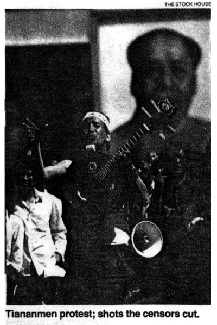
Confronting Bodies: Hong Kong authorities
Date of Action: December 1989
Specific Location: Hong Kong Arts Center, Hong Kong
Description of Artwork: Chang Chao-tang's 78 minute documentary, "Mainland China 1989." The problematic section of the film was entitled "They are Writing History," a sixteen minute, 45 second segment which covered the student movement in Peking and the government's violent response on June 4, 1989. "They are Writing History" opens with a rapid fire sequence of images of Tiananmen Square. Old black and white footage of a cluster of students protesting in May 1919 gives way to shots of a sea of marching Red Guards holding aloft their Little Red Books followed by scenes of pandemonium and scrambling students and soldiers after the shooting began in June. "Tiananmen Square was crying sadly," a narrator's voice begins. "For forty years, it has been looking coldly on the Communist Party of China which again and again repeated its bloody crackdowns on dissidents. Yet the square had never felt so hopeless and helpless facing the dawn of June 4."
Description of Incident: "In December (1989), Hong Kong audiences were promised the documentary as part of a film programme organised by the government sponsored Arts Centre covering the work of Chang Chao-tang, a Taiwan photographer and filmmaker whose films revolve around the idea of a divided homeland. But when the censors saw the first segment-"They are Writing History,"-they called it propaganda and demanded that it be excised... Invoking the Film Censorship Ordinance, the censors decided, and members of the review board concurred, that this section was likely 'to seriously damage good relations with other territories.'" The Arts Center appealed the cut. Their plea was that Article 19, the Universal Declaration of Human Rights, had been ignored.
Results of Incident: "... On 29 December, the review board sided with the censors and the cut was upheld. The chairman of the review board, Hong Kong University professor Poon Chung-kwong, again described the segment as propaganda. He said the decision to ban it was a matter of timing." Furthermore, this decision comes at a time when Hong Kong is preparing for their 1997 union with China.
Source: Margret Scott, "Fear Thy Neighbour", Far Eastern Economic Review, February 1, 1990, Pg. 28-29